

Maurice Sendak. Life and career[edit] Early life[edit] His older brother Jack Sendak also became an author of children's books, two of which were illustrated by Maurice in the 1950s.[8] Work[edit] Sendak later recounted the reaction of a fan: A little boy sent me a charming card with a little drawing on it.
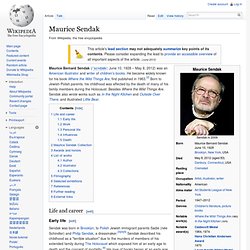
Almost fifty years later, School Library Journal sponsored a survey of readers which identified Where the Wild Things Are as top picture book. When Sendak saw a manuscript of Zlateh the Goat and Other Stories, the first children's book by Isaac Bashevis Singer, on the desk of an editor at Harper & Row, he offered to illustrate the book. His book In the Night Kitchen, originally issued in 1970, has often been subjected to censorship for its drawings of a young boy prancing naked through the story. Isaac Bashevis Singer. Isaac Bashevis Singer (Yiddish: יצחק באַשעװיס זינגער; November 21, 1902 – July 24, 1991) was a Polish-born Jewish-American author.
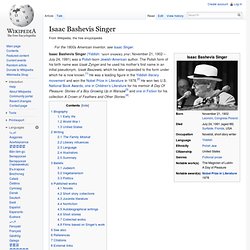
The Polish form of his birth name was Izaak Zynger and he used his mother's first name in an initial pseudonym, Izaak Baszewis, which he later expanded to the form under which he is now known.[1] He was a leading figure in the Yiddish literary movement and won the Nobel Prize in Literature in 1978.[2] He won two U.S. Aldous Huxley. Aldous Leonard Huxley /ˈhʌksli/ (26 July 1894 – 22 November 1963) was an English writer, philosopher and a prominent member of the Huxley family.
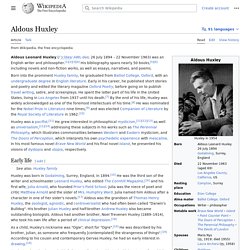
He was best known for his novels including Brave New World, set in a dystopian London, and for non-fiction books, such as The Doors of Perception, which recalls experiences when taking a psychedelic drug, and a wide-ranging output of essays. Early in his career Huxley edited the magazine Oxford Poetry, and published short stories and poetry. Mid career and later, he published travel writing, film stories and scripts. He spent the later part of his life in the US, living in Los Angeles from 1937 until his death. Michael Smith (writer)
Michael Smith (photo: Carla Borel)[1] Michael Smith (born 1976 in London) is an English writer, broadcaster and film-maker.
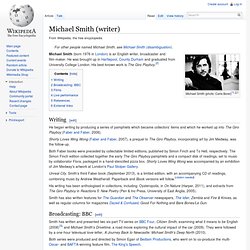
He was brought up in Hartlepool, County Durham and graduated from University College London. His best-known work is The Giro Playboy.[2] He began writing by producing a series of pamphlets which became collectors' items and which he worked up into The Giro Playboy (Faber and Faber, 2006). Milan Kundera. Milan Kundera (Czech: [ˈmɪlan ˈkundɛra]; born 1 April 1929) is the Czech Republic's most recognized living writer.[2] Of Czech origin, he has lived in exile in France since 1975, having become a naturalised citizen in 1981.
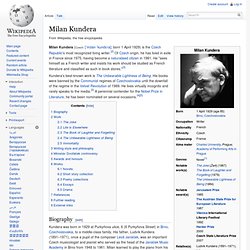
He "sees himself as a French writer and insists his work should be studied as French literature and classified as such in book stores. "[3] Kundera's best-known work is The Unbearable Lightness of Being. His books were banned by the Communist regimes of Czechoslovakia until the downfall of the regime in the Velvet Revolution of 1989. Roberto Bolaño. Roberto Bolaño Ávalos (Spanish: [roˈβerto βoˈlaɲo ˈaβalos]
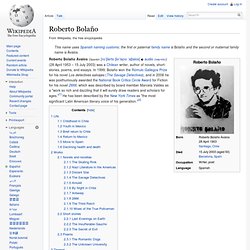
Halina Poświatowska. Halina Poświatowska (born Helena Myga, May 9, 1935, Częstochowa, Poland – October 11, 1967, Warsaw, Poland) – Polish poet and writer, one of the most important figures in modern Polish literature.
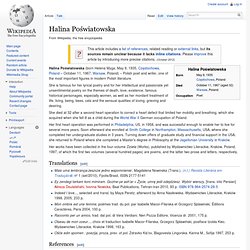
She is famous for her lyrical poetry and for her intellectual and passionate yet unsentimental poetry on the themes of death, love, existence, famous historical personages, especially women, as well as her mordant treatment of life, living, being, bees, cats and the sensual qualities of loving, grieving and desiring. She died at 32 after a second heart operation to correct a heart defect that limited her mobility and breathing, which she acquired when she fell ill as a child during the World War II German occupation of Poland. François de La Rochefoucauld (writer) La Rochefoucauld received the education of a nobleman of his era, concentrating on military exercises, hunting, court etiquette, elegance of expression and comportment, and a knowledge of the world.[1] He was married at the age of fifteen to Andrée de Vivonne,[2] a cousin of Catherine de Vivonne, the future marquise de Rambouillet.
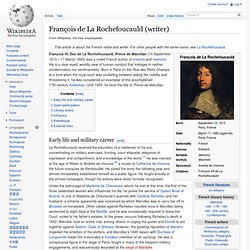
He joined the army the following year and almost immediately established himself as a public figure. He fought bravely in the annual campaigns, though his actions were never formally recognised. Charlotte Turner Smith. Charlotte Turner Smith (4 May 1749 – 28 October 1806) was an English Romantic poet and novelist.
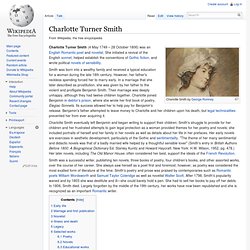
She initiated a revival of the English sonnet, helped establish the conventions of Gothic fiction, and wrote political novels of sensibility. Smith was born into a wealthy family and received a typical education for a woman during the late 18th century. However, her father's reckless spending forced her to marry early. Jean Cocteau. Early life[edit]
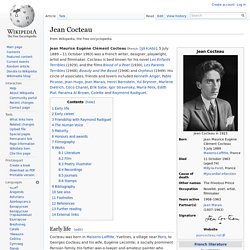
Jean Rhys. Jean Rhys /riːs/, CBE (24 August 1890 – 14 May 1979), born Ella Gwendolen Rees Williams, was a mid-20th-century novelist from Dominica. Educated from the age of 16 in Great Britain, she is best known for her novel Wide Sargasso Sea (1966), written as a "prequel" to Charlotte Brontë's Jane Eyre.[1] Early life[edit] Rhys was born in Roseau, Dominica, an island of the British West Indies. Her father, William Rees Williams, was a Welsh doctor and her mother, Minna Williams, was a third-generation Dominican Creole of Scots ancestry. Creole was broadly used in those times to refer to island white people, whether they were of mixed or non-mixed blood. Rhys was educated in Dominica until age sixteen when she was sent to England to live with her aunt. John Dryden. John Dryden (19 August [O.S. 9 August] 1631 – 12 May [O.S. 1 May] 1700) was an English poet, literary critic, translator, and playwright who was made Poet Laureate in 1668.[1] He is seen as dominating the literary life of Restoration England to such a point that the period came to be known in literary circles as the Age of Dryden.
Walter Scott called him "Glorious John. "[2] Early life[edit] Niccolò Machiavelli. Niccolò di Bernardo dei Machiavelli (Italian: [nikkoˈlɔ makjaˈvɛlli]; 3 May 1469 – 21 June 1527) was an Italian historian, politician, diplomat, philosopher, humanist, and writer based in Florence during the Renaissance. He was for many years an official in the Florentine Republic, with responsibilities in diplomatic and military affairs. He was a founder of modern political science, and more specifically political ethics.
He also wrote comedies, carnival songs, and poetry. His personal correspondence is renowned in the Italian language. He was Secretary to the Second Chancery of the Republic of Florence from 1498 to 1512, when the Medici were out of power. "Machiavellianism" is a widely used negative term to characterize unscrupulous politicians of the sort Machiavelli described in The Prince. Sarah Kay (poet) Sarah Kay is an American poet. Known for her spoken word poetry, Kay is the founder and co-director of Project V.O.I.C.E., a group dedicated to using spoken word as an educational and inspirational tool.[1][2][3][4] Sarah Kay, a graduate of Brown University, was born in New York to a Japanese American mother and a Jewish American father.[5] She began performing poetry at the Bowery Poetry Club in the East Village at the age of 14, joining their Slam Team in 2006.[6] That year, she was the youngest person competing in the National Poetry Slam in Austin, Texas.
In 2007 Kay made her television debut, performing the poem "Hands" on HBO's Def Poetry Jam.[7] She has performed at events and venues like the Lincoln Center, the Tribeca Film Festival, and at the United Nations where she was a featured performer for the launch of the 2004 World Youth Report.[8][9] Tanya Davis. Tanya Davis is a Canadian singer-songwriter and poet, based in Halifax, Nova Scotia. Her style is marked primarily by spoken word poetry set to music. Background[edit] Ernest Hemingway.
Edgar Allan Poe. Comte de Lautréamont. Comte de Lautréamont (French: [lotʁeamɔ̃]) was the pseudonym of Isidore-Lucien Ducasse (4 April 1846 – 24 November 1870), a French poet, born in Uruguay. Alfred Jarry. Seneca the Younger. Jacques Rivière. Jacques Rivière (15 July 1886 – 14 February 1925) was a French "man of letters".
He edited La Nouvelle Revue Française (NRF) from 1919 until his death. His close friend was Alain-Fournier (Henri Alban-Fournier) with whom he exchanged an abundant correspondence. W. B. Yeats. Shelagh Delaney. Simone de Beauvoir. Martin Heidegger. Martin Heidegger (German: [ˈmaɐ̯tiːn ˈhaɪdɛɡɐ]; 26 September 1889 – 26 May 1976) was a German philosopher, widely seen as a seminal thinker in the Continental tradition, particularly within the fields of existential phenomenology and philosophical hermeneutics. Søren Kierkegaard. Alexander Pope.